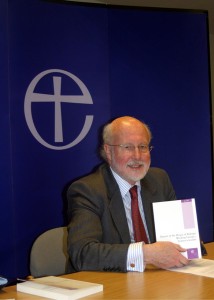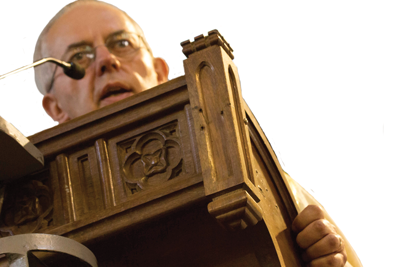2013 brought the spiritual crisis of the Anglican Communion home to its mother church. No longer would unseemly arguments and debates over sexuality and the authority of holy scripture be solely associated with the North American cousins. Sadly, you might say that the Anglican Communion’s chickens have come home to roost in the Church of England.
Archbishop Justin Welby was installed as the 105th Archbishop of Canterbury on March 21, 2013. Welby was a dramatic change from his predecessor, Rowan Williams, with his evangelical background, experience in the business world, plain-spoken nature and clean shaven face. The archbishop was quickly probed by reporters on where he stands regarding homosexuality and the church. The incoming Primate seemed to strategically assert his appreciation for the love evident in some homosexual relationships, sternly condemned “homophobia” and yet stopped short of an unequivocal, unapologetic endorsement of the Church’s traditional teaching on marriage.
This tactic was also on display in the UK House of Lords when the Church of England’s bishops had the opportunity to speak for or against Parliament’s same-sex marriage bill. Again, like most of his bishops, Welby, while opposing the bill for the “confusion” it would create, claimed:
“It is clearly essential that stable and faithful same sex relationships should, where those involved want it, be recognised and supported with as much dignity and the same legal effect as marriage.”
The archbishop went on to say:
“It is also necessary to express, as has been done already, total rejection of homophobic language, which is wrong – and more than that, sickening.”
In its own house of bishops, the Church of England removed a ban on bishops who were in civil partnerships if they remained celibate.
Reactions from the rest of the communion to these developments were quick to come. The majority of Anglican parishioners are in churches which reject such innovations. Nine leaders from the Global South Anglican network, a group of Anglican archbishops speaking for the majority non-Western Provinces signed a letter opposing the move.
“We, Primates of the Global South of the Anglican Communion, are deeply concerned and worried by the recent decision of the Church of England’s House of Bishops which approves that clergy living in civil partnerships can be candidates to the episcopate… Sadly, both the decision to permit clergy to enter civil partnerships and this latest decision which some call it a “local option,” are wrong and were taken without prior consultation or consensus with the rest of the Anglican Communion at a time when the Communion is still facing major challenges of disunity. It is contrary to “the inter-dependence” which we try to affirm between churches within the Communion. Moreover, it does not only widen the gap between the Church of England and Anglicans in the Global South, it also widens the gap between the Anglican Communion and our ecumenical partners. Further, it jeopardizes the relationship between us Anglicans living in the Global South and followers of other faiths, and gives opportunities to exploit such departure of moral standards that this type of decision may provide.”
2013 started with controversial events and ended with more controversy. The Pilling

Report, compiled by a special working group on human sexuality from the House of Bishops and released in November, suggested that the church allow “pastoral accommodation” and thus an informal public service for those in civil partnerships. From many Anglicans’ points of view, the document gave much more credence to a liberal view of scripture and was not representative of the church’s long-standing teaching. Sir Joseph Pilling, the report’s namesake, presented the document to the House of Bishops in December. From here the Church of England and entire Anglican Communion will wait to see if the bishops endorse the report or unequivocally repudiate it. The answer could come as soon as January 27th of 2014 when the full House of Bishops meets again.
Robert Lundy is Communications Officer for the American Anglican Council.


